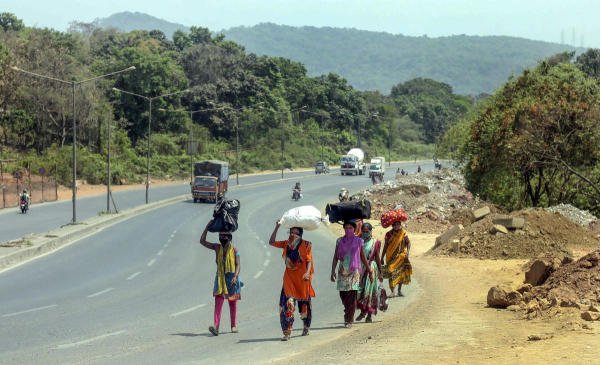
Migrant workers in India, who mostly work on a daily wage, were trying to rush back to their native villages when the lockdown was announced as the sudden lockdown had rendered factories and establishments shut, thus leaving them with no money. The government hadn’t even announced a systematic plan to ensure that they get nutritious meals every day and some money for sustenance during the lockdown. The certainty of dying from hunger was higher than them passing away due to the coronavirus.
After the Opposition and civil society went hoarse highlighting the plight of migrants, on April 29, after a month of the first phase of the lockdown, the Central government issued orders for the movement of stranded migrant workers, pilgrims, tourists, students and other persons by road, back to their home states. The responsibility of this mammoth task was given to state governments who were asked to assign nodal authorities and develop standard protocols for receiving and sending stranded persons.
Even in this exercise, the Centre washed its hands off all responsibility and asks the state governments to carry out the complex task of coordinating and coming up with a seamless process to ensure the safe return of migrants.
It is in relation to this, that the Jharkhand Nagrik Prayas (JNP), a civil society organization has condemned the Centre’s inefficiency in ensuring that the lockdown didn’t put lives in danger.
The Jharkhand Nagrik Prayas (JNP) has issued a statement about the inhuman treatment meted out to migrant workers in India. JNP says that the migrant worker population which runs into lakhs and on whose shoulders factories operate, construction projects are carried out, farmlands are tilled, homes and offices are kept shining, heavy loads are manually transported, it is eventually them who are not considered in the planning processes by the government. This is a tragedy for our democracy, JNP says.
The statement reads, “It was a most inconsiderate decision by the Centre to announce the first Lockdown for 21 days without any State consultation that night giving a notice of only four hours to the public. The most affected were the migrants living far away from their homes in Punjab, Haryana, Maharashtra, Karnataka, Rajasthan, etc. Most of these migrants were from Bihar, U.P., Jharkhand and Orissa who were working in those States because their native State had neglected to provide them jobs nearer their homes. Suddenly with the announcement of the Lockdown these migrants got cut off from their work as well from their homes with little or no support system from their places of work. The State in which they were working ignored them; their own State from where they had come forgot them. In one stroke they became stateless beings for whom there was no plan or solace. On top of this they were faced with the cruelty of no support to their families back home in their own State.”
“The second Lockdown still ignored the problem of the migrants except to announce that wherever they are they should quietly and meekly obey the order to remain there and not complain. They were told to practice the joke of ‘social distancing’ in a cramped make-shift accommodation on a hungry stomach and be satisfied with whatever was offered to them as a grace. There was no mention of when they could go back to their villages and no news about whether their distant families had been taken care of. If they came out on the streets in desperation of hunger and torture, they were beaten and pushed back to those dingy accommodations that were a mockery of preventing Corona Virus through social distancing,” it adds.
JNP says that only when the government feared a riot by the migrants, it allowed to arrange transport for their return home. Even then, just a circular was issued by the Centre asking the States to facilitate the same; the Centre absolved itself of all responsibility and washed its hands off the problem even though it was the one to create it in the first place. The main points listed in the circular were:
1. Sending State and receiving State must agree on the transfer
2. Migrants should be checked for Corona before being sent and also checked on arrival to their receiving location
3. They will be transported in sanitized buses with social distancing norms
4. All the above is State’s responsibility with the Central Government having no part
JNP says all the above could have been avoided if the Centre had taken appropriate measures before issuing the first lockdown. It adds, “At this point in time to satisfy the above conditions, firstly the States will require enormous number of Bus trips requiring financial inputs they can ill afford. Transport by Buses will take a number of months for completion of the job resulting in further alienating the poor migrants. Checking both at boarding point and receiving point will place a heavy manual and financial burden on the State already reeling under the spread of virus.”
In conclusion JNP adds that had a buffer between announcing the lockdown and executing it been in place, migrants too could have been home with their families, a facility that the rich enjoyed in the comfort of their homes. “The lone sufferer is our poor helpless migrant population who is being sacrificed on the altar of saving us the rich community from Corona Virus. Should we close our eyes and live happily thereafter?”
The entire letter may be read here:
Related:
1.6 billion informal economy workers significantly impacted by lockdown measures: ILO
Migrant labourers want to go home, but what kind of life awaits them?
Jharkhand Nagrik Prayas narrates the tale of a migrant worker stranded in Mumbai
Covid-19: Jharkhand Nagrik Prayas condemns the Centre’s inefficiency in implementing the lockdown